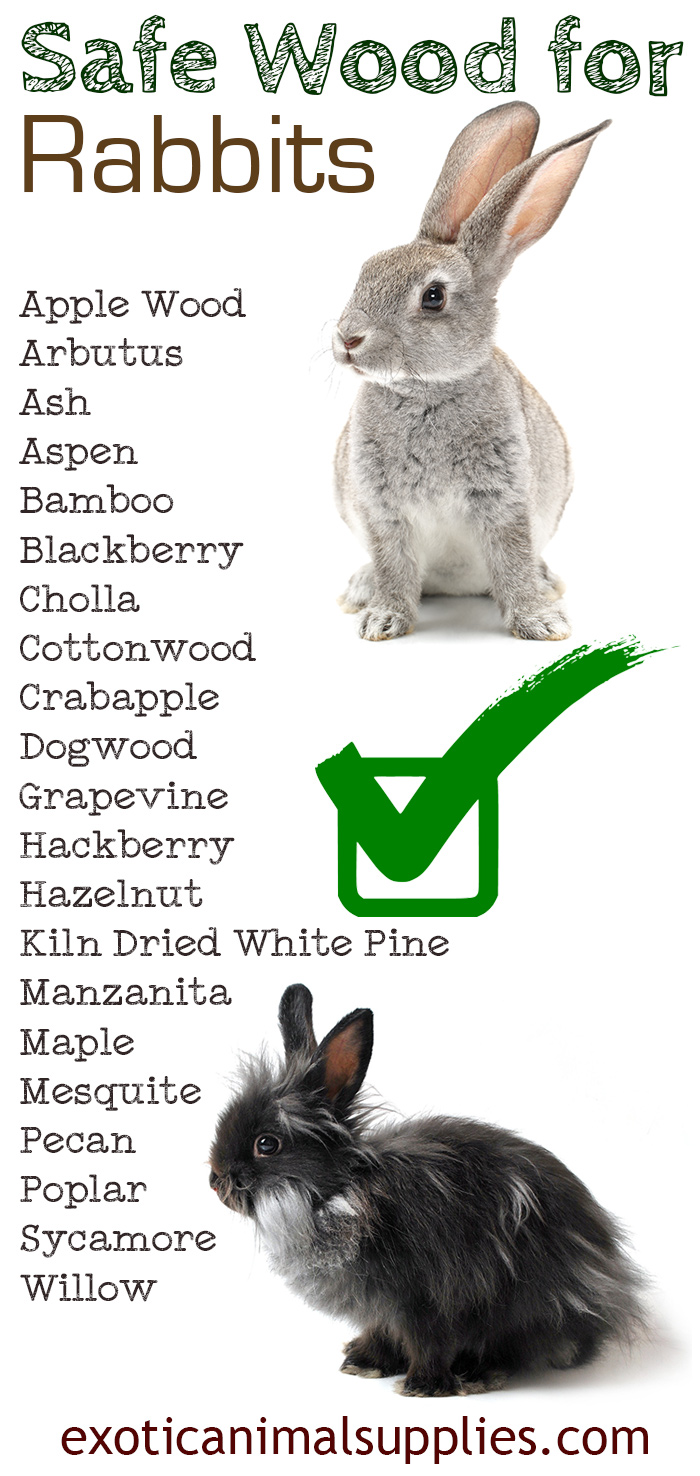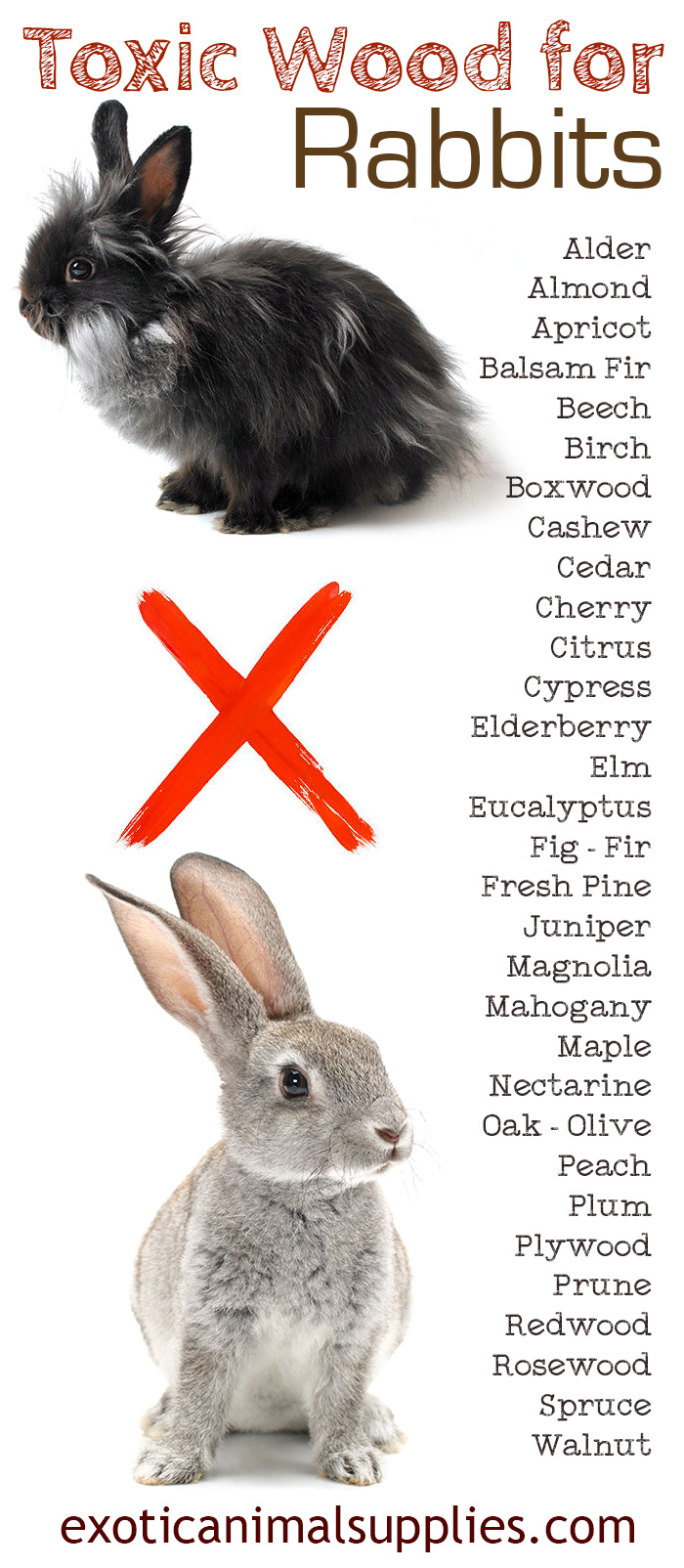
If you’ve had a pet rabbit for any amount of time, you know they love to chew. This chewing isn’t just an annoying pastime, it’s actually an important part of your bunny’s health and well-being. Since their teeth are constantly growing, they need to wear them down through chewing and gnawing. This is done by eating hay and also chewing on toys and wood chews. This is why finding safe wood for rabbits is so important.
Obviously, you don’t want them chewing on your furniture or your baseboards, but you also want to make sure your bunny isn’t chewing on any toys or chews that are toxic or unsafe. To help you in your search for safe chewables, we’ve rounded up a list of wood and other materials that are safe for rabbits. We’ve also put together a list of toxic wood and unsafe materials you should not give to your bun. Use these lists when buying toys, cage accessories, and deciding on other materials to give your pet rabbit.
There’s a lot of conflicting information out there about what is and isn’t safe for exotic pets, rabbits included. Follow the advice of your vet and always air on the side of caution if you’re not sure whether a material or wood will be safe for your rabbit.
Contents
Safe Wood for Rabbits
- Apple Wood
- Arbutus
- Ash
- Aspen
- Blackberry
- Cholla
- Cottonwood
- Crabapple
- Dogwood
- Grapevine
- Hackberry
- Hazelnut
- Manzanita
- Maple (Sugar, Silver)
- Mesquite
- Pecan
- Pine (Kiln-Dried White)
- Poplar
- Sycamore
- Willow

Other Safe Materials for Rabbits
- Alfalfa
- Bamboo Cane
- Cardboard
- Coconut Shell
- Loofah (Untreated and undyed)
- Paper
- Pine cones (untreated and roasted in the oven for 45 minutes at 200 degrees)
- Plastic Toys (hard toddler toys or cat toys)
- Seagrass
- Sisal Rope (look for natural and untreated)
Unsafe and Toxic Wood and Materials for Rabbits
- Alder
- Almond (can produce cyanide)
- Apricot (freshly cut branches are toxic)
- Balsam Fir
- Beech
- Birch
- Black Locust
- Blackwood
- Bog Wood
- Boxwood
- Cashew
- Cedar
- Cherry
- Citrus Woods (lemon, orange, lime, etc.)
- Cocobolo
- Cypress (including bald cypress)
- Dahoma
- Ebony
- Elang Mukulungu
- Elderberry
- Elm
- Eucalyptus
- Fig (including cape fig)
- Fir
- Goncalo Alves
- Greenheart
- Hemlock
- Horse Chestnut
- Iroko
- Juniper
- Kapok
- Laurel
- Magnolia
- Mahogany
- Mansonia
- Maple
- Mimosa
- Mopane
- Myrtle
- Nectarine
- Oak
- Olive
- Peach (freshly cut branches are toxic)
- Peroba Rosa
- Pine (fresh pine is toxic as are fresh pinecones)
- Plum
- Plywood
- Prune
- Quebracho
- Redwood
- Rosewood
- Satinwood
- Sassafras
- Sequoia
- Snakewood
- Spruce
- Teak
- Walnut
- Wenge
- Yew
- Yucca
- Yunnan
- Zebrawood
A nice general rule to follow when evaluating wood for your pet rabbit is that wood from most fruit trees are OK, except for trees that produce a fruit with a solid pit (peaches, cherry, plum, etc.) Even though the fruit is safe for your rabbit to eat, the branches are not.

The information on this page is for your reference only. We’ve done our best to verify the accuracy of this information by referencing information from veterinarians and rabbit breeders. Be sure to check with a rabbit savvy exotic veterinarian for specific advice and information on the health of your pet rabbit.
Want to learn more about caring for your rabbit? Check out these other articles:
Safe Wood for Rabbit Toys & Chews
Rabbit Toys
Rabbit Diet & Nutrition
Rabbit Name Ideas
How to Keep Your Rabbit Cool in Hot Weather
Rabbit Grooming 101
